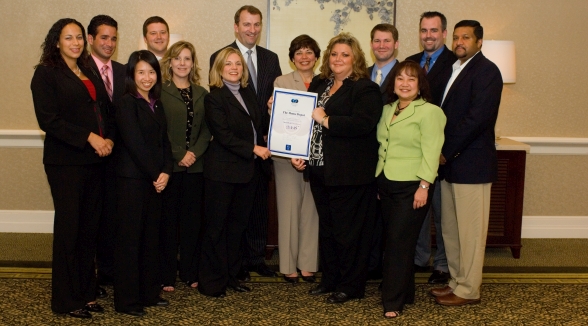ATLANTA JULY 2006
HOME DEPOT DESIGNATED BEST IN CLASS

CELEBRATE THEIR ACCREDITATION
AT THE INTERCONTINENTAL BUCKHEAD ATLANTA
“United States BCO’s Sourcing in China: The Logistics Challenges” is an ongoing Institute research program focussed on southern China . The first module examined on how the US Beneficial Cargo Owners (BCO’s) from the consumer goods and retail sectors were coping with this region’s particular logistical challenges.
The research program is designed to understand how companies manage the dynamics of global trade in this new scenario and to determine how the most adaptive were coping with its challenges. Furthermore The aim of the research is to establish accepted best practice by the stakeholders in Sino–US trade, creating ‘bench-marks’ and to promote standard operating procedures and their adoption by other shippers.
The research identified the early adopters at brand level and led to the accreditation of Home Depot with “Best in Class” in the execution of container logistics strategy.
Home Depot’s international logistics departments has direct relationships with each stakeholder in its global logistics process and while like majority of Fortune 500 companies, it outsources directly to third party logistics provider’s (3PL’s) however it regards as “best practice” to have direct contact with the the key logistics service providers, particularly the liner shipping company and the container terminal operator. Home Depot are the pioneers in managing direct relationships with container terminal operators.
Beneficial Cargo Owners including Home Depot do not have contractual relationship with any of stakeholders inside the port, leading it to a dependence on third parties for status reports etc. This leads to misreporting and guessing about the status of a particular container. Home Depot mitigated this by liaising directly with the container terminal operator. This led led directly to greater Visibility, increased Velocity and added Value add in their container logistics processes.
For terminal operators direct relationships with their end user had a direct influence on decisions by shipping lines to include their terminal on their network maps. Shipping lines are heavily influenced by their upstream customers − the port’s end users.
The collaboration also leads to logistics innovation particularly in the area of “Port Centric Logistics” Port Centric Logistics models have led to a myriad of new logistics programs: For instance DC Bypass whereby Beneficial Cargo Owners instead of shipping containers of a product to the USA where they would then be cross-docked for store delivery, execute the cross docking process in China,thereby eliminating a relocation move at the receiving port and, in doing so, cut out considerable costs.

